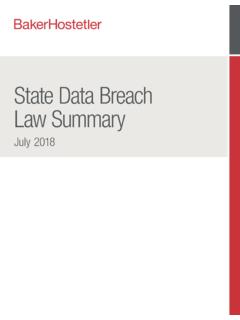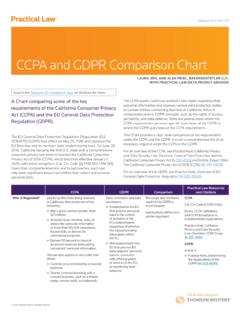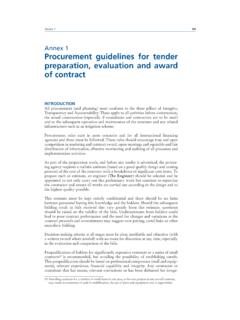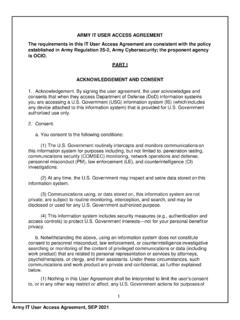Transcription of Foreign Corrupt Practices Act (“FCPA”) - BakerHostetler
1 Foreign Corrupt Practices Act ( FCPA ). OVERVIEW. The Foreign Corrupt Practices Act ( FCPA ) was passed in 1977 in an effort to address concerns over the integrity of markets after hundreds of companies admitted to paying over $400 million to Foreign government officials. The FCPA has two primary provisions: (1) an anti-bribery provision which makes it unlawful for a company or citizen, and certain Foreign issuers of securities, to make a Corrupt payment to a Foreign official for the purpose of obtaining or retaining business and (2) an accounting provision which requires companies with securities listed on stock exchanges in the United States to make and keep books and records that accurately and fairly reflect the transactions of the corporation and to devise and maintain an adequate system of internal accounting controls.
2 Not only are companies subject to the requirements of the FCPA, but so are officers, directors, employees, agents and shareholders acting on behalf of the entity. FCPA enforcement actions continue to be a high priority for the Securities and Exchange Commission ( SEC ) and the Department of Justice ( DOJ ). A review of recent enforcement actions demonstrates that the way a company responds when suspected violations of the FCPA are discovered has a large influence in whether penalties are imposed by the SEC and DOJ, rendering early detection and analysis of suspected violations critical. To Whom it Applies The FCPA anti-bribery provisions apply to all issuers of securities registered on stock exchanges in the United States, any company organized under the laws of the United States, or with its principal place of business in the United States and any citizen or resident of the United States.
3 Such companies and individuals can be held liable based upon actions taken within the United States including telephone calls, wire transfers and interstate travel, as well as for any action taken by affiliated entities or individuals outside of the United States in furtherance of a Corrupt payment. Thus, it is possible for an issuer or domestic concern to be held liable for an improper payment authorized by employees operating outside of the United States and using money located in Foreign accounts. Officers, directors, employees, agents and stockholders acting on behalf of an issuer or company can be held liable under the FCPA and can face charges distinct from those of the entity.
4 The 1998. Amendments to the FCPA expanded the jurisdiction of the FCPA to include Foreign companies if they cause, directly or through agents, an act in furtherance of a Corrupt payment to take place within the United States. The accounting provisions of the FCPA only apply to entities, and individuals acting on behalf of those entities, with securities listed on a stock exchange. Anti-Bribery Provisions - Payments to Foreign Officials to Obtain or Retain Business 15 78dd-1(a) of the FCPA provides that: It shall be unlawful for any issuer which has a class of securities registered pursuant to section 781 of this title or which is required to file reports under section 78o(d) of this title, or for any officer, director, employee, or agent of such issuer or any stockholder thereof acting on behalf of such issuer, to make use of the mails or any means or instrumentality of interstate commerce corruptly in furtherance of an offer, payment, promise to pay, or authorization of the payment of any money, or offer, gift, promise to give, or authorization of the giving of anything of value to- (i) any Foreign official for purposes of- (A) (i)
5 Influencing any act or decision of such Foreign official in his official capacity, (ii) inducing such Foreign official to do or omit to do any act in violation of the lawful duty of such official, or (iii) securing any improper advantage; or (B) inducing such Foreign official to use his influence with a Foreign government or instrumentality thereof to affect or influence any act or decision of such government or instrumentality, in order to assist such issuer in obtaining or retaining business for or with, or directing business to, any person;. (2) any Foreign political party or official thereof or any candidate for Foreign political office for purposes of- (A) (i) influencing any act or decision of such party, official, or candidate in its or his official capacity, (ii).
6 Inducing such party, official, or candidate to do or omit to do an act in violation of the lawful duty of such party, official, or candidate, or (iii) securing any improper advantage; or (B) inducing such party, official, or candidate to use its or his influence with a Foreign government or instrumentality thereof to affect or influence any act or decision of such government or instrumentality. in order to assist such issuer in obtaining or retaining business for or with, or directing business to, any person; or (3) any person, while knowing that all or a portion of such money or thing of value will be offered, given, or promised, directly or indirectly, to any Foreign official, to any Foreign political party or official thereof, or to any candidate for Foreign political office, for purposes of- (A) (i) influencing any act or decision of such Foreign official, political party, party official, or candidate in his or its official capacity, (ii)
7 Inducing such Foreign official, political party, party official, or candidate to do or omit to do any act in violation of the lawful duty of such Foreign official, political party, party official, or candidate, or (iii) securing any improper advantage; or (B) inducing such Foreign official, political party, party official, or candidate to use his or its influence with a Foreign government or instrumentality thereof to affect or influence any act or decision of such government or instrumentality, in order to assist such issuer in obtaining or retaining business for or with, or directing business to, any person. 15 78dd-2 applies identical prohibitions to domestic concerns which is defined to include any individual who is a citizen, national, or resident of the United States.
8 And any corporation, partnership, association, joint-stock company, business trust, unincorporated organization, or sole proprietorship which has its principal place of business in the United States, or which is organized under the laws of a State of the United States or a territory, possession, or commonwealth of the United States.. The underlying premise of the FCPA is that bribes to Foreign officials are prohibited and sanctionable. Bribes under the FCPA are regarded as the giving of anything of value to the Foreign official, even if the payment is permissible under local law. Such Corrupt payments, which can include both cash and gifts, are prohibited if they are intended to influence the act or decisions of a Foreign official to secure or retain business transactions.
9 Payments that influence Foreign officials to omit acts or duties also fall within the purview of the FCPA. For the purposes of the FCPA, Foreign officials include Foreign political parties and candidates for Foreign political offices. 2 Foreign Corrupt Practices Act Overview Exception To The Anti-Bribery Provisions The FCPA creates an exception for facilitation payments or those payments meant to facilitate the performance of a routine governmental action by an official, political party or candidate. The FCPA gives examples of a routine governmental action, such as obtaining official documents to qualify a person to do business in a Foreign country or processing governmental papers, such as visas and work orders.
10 Routine governmental action also includes: providing police protection, transporting mail, scheduling inspections associated with contract performance, inspections related to transit of goods across the country, providing phone service, power and water supply, loading and unloading cargo or protecting products from deterioration. This notwithstanding, routine governmental action does not include influencing/facilitating a decision by an official to award business or to continue to do business between the entity/person and the Foreign government . Because the distinction between a permissible facilitating payment and an improper bribe can be difficult to discern, it is important to always consult with counsel prior to making any facilitating payment.








